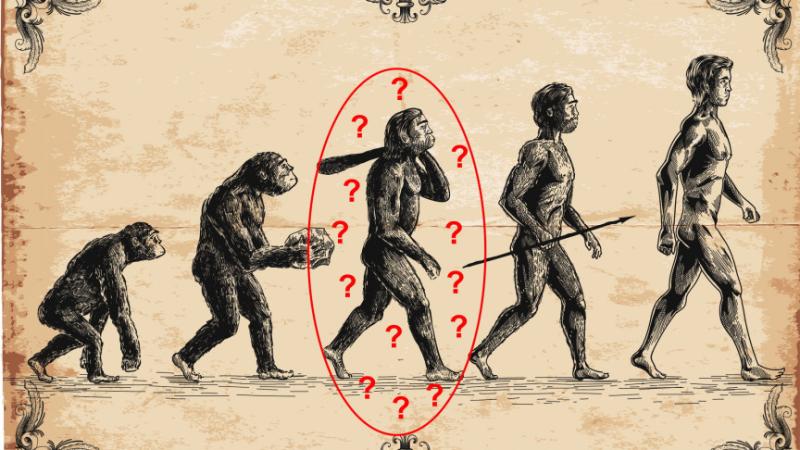No, Humans Didn't Evolve From the Ancestors of Living Apes
By: Marcia Wendorf (Interesting Engineering)


No, humans didn't evolve from apes or monkeys. Apes and monkeys evolved separately. The last common ancestor (LCA) was neither ape or monkey or human.

The truth is that we don't know where we, homo sapiens, came from. In his 1871 work, In The Descent of Man, Charles Darwin speculated that humans originated in Africa, and that we evolved from an ancestor who was different from any currently living species.
Now, a new study by an international group of paleoanthropologists, with a wide range of specialties, have backed up Darwin by concluding that it is likely that the last ancestor that we shared with apes had its own distinct set of traits that are different from those of both modern humans and modern apes.
Who was this ancient ancestor?
Chimpanzees, with whom we share 98 percent of our DNA, are in genus Pan, while humans are in genus Homo. Humans diverged from chimpanzees between 9.3 and 6.5 million years ago.
Historically, two major approaches have been used in analyzing human ancestry:
- Top-down - uses living apes, especially chimpanzees, to reconstruct our origins
- Bottom-up - uses the fossil record of both humans and apes; it shows multiple possibilities both for what the LCA looked like, and where he roamed.
In reviewing the studies surrounding these diverging approaches, the authors of the paper argue that there are limitations to relying on just one or the other of these opposing approaches. This is because the top-down studies often assume that modern ape species share habitat and features of earlier groups, while bottom-up studies tend to give individual fossil apes a more important evolutionary role than may be warranted.
In an attempt to reconcile these approaches to identifying our ancient ancestor, the scientists looked at what the environment must have been like for the Pan-Homo last common ancestor, or LCA.
The Miocene epoch existed from around 23 to 5.3 million years ago, and a number of fossil ape genera from that era have been found. However, they show a combination of features common to both "orthograde" (upright) and "pronograde" (walking on all fours) body plan, which has led some scientists to exclude the Miocene apes from the human lineage, and there is no scientific consensus on the evolutionary role played by these fossil apes.
Some scientists espouse the theory that some Miocene apes dispersed out of Africa and into Eurasia, approximately 16 to 14 million years ago, before the hominins diverged from apes. Some of these apes gave rise to the line that produced orangutans, and the European "Dryopith" apes, while others returned to Africa where they evolved into modern African apes and hominins. Others interpret dryopiths as broadly ancestral to hominids or as an evolutionary dead end.
During the late Miocene period in Africa, increased habitat fragmentation may have led to the evolution of African ape knuckle-walking, and hominin bipedalism, or walking on two feet, from a common orthograde ancestor who lived in the trees. Walking on two feet might have allowed our human ancestors to adapt their diets and locomotion, and escape the "specialization trap" that kept other apes in an arboreal environment.
The study concluded that future research efforts should focus on looking for Miocene ape fossils in areas where they have yet to be found. The scientists also concluded that data-driven modeling should take precedence over trying to fit evolutionary scenarios to every fossil find.
Hominin fossils have been found in eastern and central Africa, and possibly also in Europe. Fossils of over 50 genera of ancient apes have been found in Africa and Eurasia, however, as Dr. Sergio Almecija, a researcher in the Division of Anthropology at the American Museum of Natural History told Sci-News "... there is no scientific consensus on the evolutionary role played by these fossil apes."
Kelsey Pugh, one of the study co-authors, added that, "The unique and sometimes unexpected features and combinations of features observed among fossil apes, which often differ from those of living apes, are necessary to untangle which features hominins inherited from our ape ancestors and which are unique to our lineage."
Where do we go from here?
The new study seems to put us back to square one as to where we came from. Every ancient religion has its own theory of how we came to be. Giorgio A. Tsoukalos, better known as "the hair guy," who is a producer of the show "Ancient Aliens" on which he often appears, theorizes that humans arose due to visits made to Earth made by ancient aliens. Tsoukalos shares those opinions with others including Erich von Daniken, Zecharia Sitchin, and Robert K. G. Temple.
Like the lyrics in British band The Who's 1978 song "Who Are You?"
Well, who are you? (Who are you? Who, who, who, who?)
I really want to know (Who are you? Who, who, who, who?)
Tell me who are you? (Who are you? Who, who, who, who?)
Because I really want to know (Who are you? Who, who, who, who?)
We'd all like to know who our ancient ancestor was and how we came to be.





The last common ancestor (LCA) wasn't an ape, monkey, or human. Or perhaps the LCA was all three.
So, what does that tell us?
Of course the LCA wasn't an ape. If it were, it would have been an ape instead of a common ancestor. It was probably an ape-like ancestor, which diverged into modern hominid species.
That we do know exactly where humanity came from, and that every word in The Holy Bible is an 100% accurate description of exactly what happened?
Do I detect a hint of sarcasm?
One excuse is as good as another.
The Bible is an excuse. Evolutionary theory is an explanation.
Seems to be a copious amount of "we don't know" in that explanation.
Science is honest when it says it doesn't know. But there is a lot that is known too. And the evidence supports the explanation.
"So, what does that tell us?"
It tells me to continue not listening to ancient alien theorists. Shame on the author for bringing them into her article.
Yeah, I thought that was kinda weird.
Ancient aliens? I think that was the plot to a Star Trek episode once.
Made me sad when the history channel basically just became the pawn shop alien channel.
Me too. I remember when HC actually had shows about history. Battle 360 was one of my favorites.
I hadn't thought about it, until reading your post, but this is probably why I don't watch the history channel anymore. Sadly, there are a number of channels, I used to enjoy content on, that I haven't visited in a long while. I still love Iron Chef though. I prefer the original, but I'll take the American version too.
Wow. This is a horrible article. Makes you wonder how stuff like this gets published.
Where did that title come from? It's incorrect and blatantly contradicted by the article itself.
Title — "No, Humans Didn't Evolve From The Ancestors Of Living Apes"
Article — "Humans diverged from chimpanzees between 9.3 and 6.5 million years ago."
Sharing a common ancestor with pan is not in question here. Chimps and bonobos are living apes, so yes, humans (along with pan) evolved from the ancestors of living apes. Sheesh.
The study referenced by the article is behind a paywall, but one can see from the public abstract that the simple point being made is that Miocene apes (known and as-yet unknown) lacking obvious pan-homo traits should not be prima facie excluded in the search for a precise pan-homo LCA. Not exactly an earth-shattering conclusion, and certainly nothing that justifies this articles title (the study is simply titled: Fossil apes and human evolution).
And then dropping aliens into it, just because? Good grief.